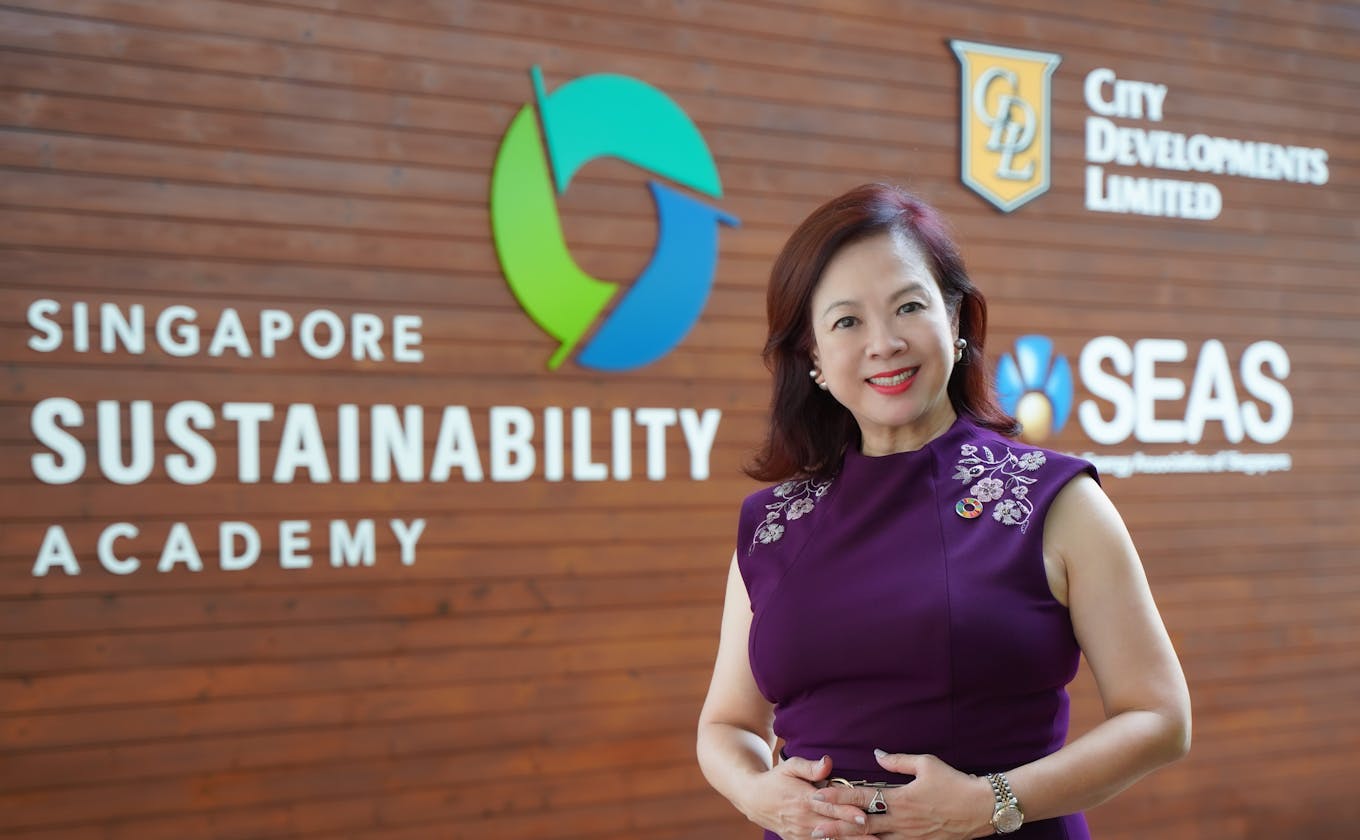Sustainability doesn’t have to come at the expense of profitability – and companies should bear this in mind, says Susan Chong, founder and chief executive officer of Greenpac.
Reducing waste – all while saving on cost – is precisely what Chong’s company, Greenpac, has been helping its clients to achieve for over two decades. “Most people have a perception that going green will cost more. But we want to make it clear to other businesses that they can reduce their impact on the environment and still save on costs,” Chong said.
Champions of Good, a national recognition by Singapore’s National Volunteer and Philanthropy Centre (NVPC) for companies that are exemplary multipliers of good, has also been conferred on Greenpac four times.
Greenpac is a Singapore-based innovative packaging solutions company that partners with companies, some of which are Fortune 500 companies, and provides them with sustainable packaging solutions. This objective, Chong said, also serves as the company’s corporate purpose. “Packaging generates a lot of waste. So we started our company with the corporate purpose of introducing environmentally-friendly packaging solutions,” she added.
It is also important to note the differences between corporate purpose and sustainability, which are often used interchangeably. According to the article The Difference Between Purpose and Sustainability (aka ESG), “purpose comes first and sustainability can either contribute to it or can detract from it.” The article is written by Robert G Eccles, visiting professor of management practice, Colin Mayer, the Peter Moores professor of management studies, and Judith Stroehle, Senior Research Fellow, at the Saïd Business School at the University of Oxford.

Susan Chong is the founder and CEO of Greenpac, a Singapore-based innovative packaging solutions company.
“Companies that are making investments in sustainability while failing to produce profitable solutions to people and planet are also failing in purpose. Companies that are profitable while degrading the environment and society are focused on profits, not purpose,” the article noted, which was published in the Harvard Law School Forum on Corporate Governance. Mayer defined corporate purpose as “producing profitable solutions for the problems of the people and planet, and not profiting from creating problems.”
Figures released by BSI Group, the United Kingdom’s national standards body, in January 2023 suggest that there is increased pressure on companies around the world to act on their corporate purpose. Its poll of 2,000 British consumers found that two-thirds (66 per cent) of consumers would abandon a product or business that is acting inconsistently with its purpose. The survey also found that 68 per cent of consumers are willing to spend more with an organisation that keeps to its stated purpose. “The research demonstrates that urgent action is needed to align organisations with a sustainable future,” Anne Hayes, director of sectors, BSI Group, noted in the company’s press release announcing the study.
This may be a wake-up call for many companies in Singapore, which still lack a corporate purpose, according to a July 2022 study by continuing education and training provider NTUC LearningHub. While most company leaders believe that it is important to integrate sustainability objectives into their overall business strategy, more than half of companies (56 per cent) lack sustainability goals in place. The study, which polled 200 business leaders in the city-state, also found that 47 per cent of those surveyed said that a lack of expertise in sustainability was to blame, with only 31 per cent believing that they had well-defined sustainability strategies in place. Only 12 per cent indicated that they had plans to implement one.
It is crucial for companies to communicate their corporate purpose to not only their customers but also their staff and suppliers, Chong added, noting that doing so will help employees to feel a sense of purpose in their job. “We remind them that through their role, they are helping to ensure a more sustainable future for the planet,” she said. “By informing our suppliers about our corporate purpose, we are able to align them with our business’ goals and ensure our entire supply chain is sustainable.”
Entwining profits with purpose
Companies that have yet to define their organisation’s corporate purpose can begin by going back to the drawing board, explained Suzy Goulding, head of sustainability of Asia Pacific and the Middle East, at MSL Group, a public relations company. “Company leaders need to ask themselves two simple but key questions: ‘why do we as a company exist?’ and ‘what would people miss if we didn’t?’” she said. “By having this as a starting point, you avoid ending up with a purpose that is too far removed from what you are there to do as a company.”
She noted that having a corporate purpose is ever more important today, especially among companies that operate in industries that face regular public scrutiny. “A corporate purpose can strengthen a company’s license to operate. This is especially important for companies that are operating in sectors that are deemed controversial, for example, the oil and gas or energy sector. It can add robustness and weight behind why a company exists in the first place,” she said.
Ensuring long-term value
Having a well-defined corporate purpose can help companies to create long-term sustainable value, and also guide them towards achieving their vision, noted Esther An, chief sustainability officer of City Developments Limited (CDL), a Singapore-listed multinational real estate company.

Esther An is the chief sustainability officer of City Developments Limited, a Singapore-listed multinational real estate development company.
An said that having a corporate purpose is particularly important for companies in the property development sector due to the challenges in cutting carbon from real estate development. “The moment we get a hold of a plot of land, we ask ourselves how can we engage with architects, engineers and individuals in our supply chain to ensure that we create quality yet sustainable developments for homebuyers?” said An. She also added: “Bringing one building to net zero is already quite difficult, but we hope to achieve this across all our new developments and wholly-owned assets under our direct management and operational control in Singapore by 2030.”
CDL is also a four-time Champion of Good. The company adopts a three-pronged approach to its developments. This includes designing and developing sustainable and green buildings, managing buildings in an energy and resource-efficient manner, and engaging stakeholders to support its sustainability commitments.
CDL is guided by its vision, added An, which is “to be recognised by customers, employees and peers as an innovative creator of quality and sustainable spaces,” as the company has stated on its website. CDL also strives to fulfil its mission, which it calls CREATE, where it pledges to Conceptualise spaces and solutions, Respect planet Earth, Encourage diversity of people and ideas, Advance the communities they operate in, Take prudent risk for sustainable returns, and Embrace a forward-looking mindset. “As CDL celebrates its 60th anniversary this year, CREATE is even more meaningful as it is very much linked to sustainability and summarises what our corporate purpose is all about,” said An.
Because CDL’s corporate purpose revolves around tapping on innovation to build quality and sustainable developments, it is crucial that sustainability is also incorporated into the organisation across all levels, An noted. “A company can’t just have one department or ‘sustainability team’ driving the company’s entire sustainability agenda; it must be integrated well into the business,” she said, noting that the tone has to be set from the top. “Our sustainability agenda is driven vertically at every level – from the board, senior management, and horizontally across all core business and operational units.”
Companies should ensure that they set targets and measure their performance along the way. This, An pointed out, allows organisations to clearly view the positive or negative impact they are making on the environment. “There’s no point in setting targets if you don’t measure anything. When you measure your performance, you’re able to look at gaps in the company’s performance; you’ll be able to see if you’re on or off track,” she added.
Looking at the bigger picture
While shifting to more sustainable practices and solutions may have an impact on a company’s bottom line, Goulding added that company leaders should view the organisation from a more macro, long-term perspective. “While there may be a short-term hit on profitability, a sustainable business will likely be around for much longer,” she said.
At the end of the day, having a clear corporate purpose isn’t just a message for investors and stakeholders, but is able to create real business value for a company, Chong summarised. “Our purpose is to provide sustainable solutions, and our business model is crafted around this premise. So it’s very important to align why we are doing this with what we are doing,” she said. “It is through this purpose that we are able to create value.”
Sign up here to Become a Company of Good.






















